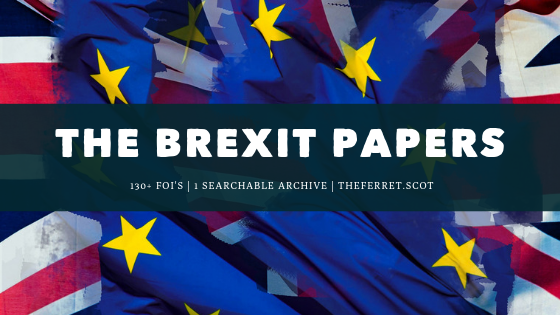Scotland will be vulnerable to outbreaks of infectious diseases and less prepared to tackle them, if a ‘hard’ EU withdrawal from the European Union (EU) takes place next March, according to the national body responsible for health protection.
A report by Health Protection Scotland (HPS) on the impact of Brexit on cross-border collaboration with the European Centre for Disease Prevention Control (ECDC) has been obtained by The Ferret under freedom of information law, as part of the Brexit Papers.
If the UK ended up with the “worst case scenario” – a relationship with the EU akin to that of Switzerland – the report warned that “we would have no relationship with ECDC, no access to intelligence and no participation in surveillance systems.”
That would mean that Scotland’s access to the European Epidemic Intelligence Information System (EPIS) could suffer. “EPIS is a system wherein countries can talk about current issues and threats before they become a formal alert,” the report said.
“It enables sharing of early intelligence to mitigate risks and enable preparedness as well as sharing knowledge. This will impact on our preparedness and responsiveness to outbreaks in Scotland.”
A hard Brexit would deny scientists in Scotland access to communication systems that track healthcare associated infections and antibiotic resistance and which offer fast access to European expertise, argued the report. “We would have no access to these data, protocols and would be unable to benchmark,” it added. “This has been important in driving improvements in Scotland.”
HPS credited participation in ECDC for helping to improve evidence-based infection surveillance systems, laboratory protocols and the interpretation of results. The European centre also co-ordinated investigations of disease outbreaks, and help provide guidance on preventing infections.
The report, written in December 2016, said that even in a best-case scenario with the UK working as a ‘recognised partner’ with the EU, there will be substantial uncovered costs for participation in network meetings and projects.
“Getting a seat at the table and obtaining funding for attending EU network meetings and collaborations has been difficult for Scotland for years as organisations in England often are the first point of contact for all of the UK,” it said.
“This situation is likely to get worse as UK government, and possibly Scottish Government, will have to pick up the meeting and network costs and fund grants for development of new emerging areas.”
The report concluded: “Following exit from the EU it may also be more difficult to convince our government(s) that aligning with EU developments should be a priority. A confusing strategic landscape could be a consequence in addition to the deteriorating financial situation.”
Brexit impact: child protection fears over EU information sharing
Hugh Pennington, emeritus professor of microbiology at the University of Aberdeen, said that if there were a hard Brexit it would be important for HPS to establish its own outbreak intelligence systems, drawing on surveillance and information supplied by global bodies such as the World Health Organisation. “There may be a slight lag in information from Europe reaching us, but it’s not in their interests to keep these things quiet,” he said.
“We will just have to make it our business to know what’s happening.”
Of greater concern to him would be Scotland’s loss of influence over EU public health development plans, and the costs associated with replicating existing surveillance systems. “Public health is not seen as a priority in some countries, but it should be,” he said. “The bodies that track outbreaks and the evolution of organisms need good support, not to have their budgets cut.”
The HPS report reflected analysis of the risks of a no-deal Brexit to UK public health, prepared by the Brexit Health Alliance. Bringing together NHS bodies, medical research, industry, patients and public health organisations, the BHA stated: “There may be a weakening of the UK’s response to pandemics and an increase in the chances of diseases spreading as we lose partnerships with key EU bodies, such as the European Centre for Disease Prevention and Control.”
An alliance spokesman told The Ferret: “An agreement between the EU and the UK would negate, reduce and/or mitigate these risks, depending on the nature of the deal.”
Health Protection Scotland declined to update its position on Brexit. A spokeswoman told The Ferret: “Unfortunately at this time we don’t think it is appropriate for us to comment any further on this paper which was produced for internal purposes only.”
The Brexit Papers
This story was based on documents released as part of The Ferret’s Brexit Papers project. You can search across more than 350 Brexit documents from Scottish public bodies largely obtained by freedom of information requests.
Photo thanks to US Air Force Airman 1st Class, Jason Couillard.















